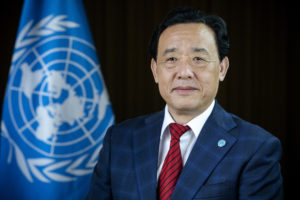
October 21, 2020//-The COVID-19 pandemic has cast a harsh light on existing inequalities and vulnerabilities in Africa and has triggered unprecedented challenges to the continent’s food systems, despite the fight of farmers, no matter the size, to keep producing and delivering food for all.
Even before the pandemic hit, hunger was already on the rise in the region. In this uncertain time, we need to promote innovation, solidarity, coherence and strong partnership among and within African countries.
In this sense, FAO is bringing together its African Members, from Angola to Zimbabwe, as well as representatives from partner organizations, the private sector, civil society and other stakeholders for the 31st Session ofFAO’s Regional Conference for Africa.
The aim is to discuss the priority issues that matter for food and agricultureonthe continent as we fast approach the deadlines for achieving Sustainable Development Goal 2Zero Hunger by 2030 and the African Union’s Malabo targets on food security and nutrition by 2025.
Urgency and extraordinary collaboration must characterise the discussions. Bold actions must be taken now. According to the 2020 edition of the State of Food Security and Nutrition in the World, Africa has the highest prevalence of undernourishment (19.1 percent) – more than twice the global average (8.9 percent) – and the fastest growth in the number of hungry people compared to other regions.
Because of COVID-19, undernourishment in Africa could increase by up to 40 million people in 2020. In some countries of the region the cost of healthy diets is between 4 and 7 times higher than average food expenditures.
FAO estimates thatdonors and affected partner countries must double their investments from now until 2030 to drive progress towards ending hunger, stretching the capacities of national spending and international aid budgets.
FAO is doing business differently to address this gap and help African countries to radically shift the dial towards ensuring food security and promoting sustainable agri-food systems.
New ways of working together
We must adopt innovative approaches and apply modern science and technology when facing new situations and challenges. This includes innovation of the mindset, innovation of business and cooperation models, and particularly the introduction of digital applications.
To support countries to address the adverse socio-economic effects ofthe pandemic, FAO has recently launched a holistic and comprehensive COVID-19 Response and Recovery Programme to provide an agile and coordinated global response aimed at ensuring access to nutritious food for everyone by mobilizing all forms of resources and partnerships at country, regional and global levels.
The Programme is in line with the UN agenda to “build back better”, and in pursuit of the Sustainable Development Goals.
It aims to mitigate the immediate impacts of the pandemic while strengthening the longer-term resilience of food systems and livelihoods.
Furthermore, through our Hand-in-Hand Initiative we are helping to pinpoint key bottlenecks and opportunities for innovation, investment and institutional change.
We are working with countries to connect them to investment partners including private capital to accelerate agricultural transformation and sustainable rural development based on data and information.
In Africa, the Initiative is being rolled out so far in Burkina Faso, Cabo Verde, Ethiopia, Gabon, Guinea Bissau, Mali, Niger, Nigeria, Rwanda and Zimbabwe and we are working towards matchmaking more countries with new partners.
Big data for big gains
High-quality, accessible, timely, reliable and disaggregated data is crucial for country-owned agricultural policies, but this data often simply does not exist in many countries. That’s why FAO is intensifying efforts to strengthen national statistical capacities.
We areusing sophisticated tools such asthe Hand-in-Hand GeoSpatialPlatform which delivers key information for decision-making, and the Data Lab for Statistical Innovation which combines unconventional data sources, big data, artificial intelligence and data science for decision-making and impact evaluation.
Digital innovation
In order to feed Africa’s rapidly growing and urbanising population, the continent’s booming number of young people need to see agriculture as an attractive business choice.
Through technology, the growth of mobile phone use, and digital innovations we are aiming to incentivise Africa’s young people to get involved along the whole food value chain, from production and aggregation to processing and marketing.
FAO is assistingits Members to develop their own digital agriculture strategies in support of digitally driven agri-food systems through e-agriculture guides.
National e-agriculture strategies are essential for any country that is planning on using information and communication technologies (ICTs) for agriculture.
An effective roadmap for e-agriculture requires a holistic, multi-stakeholder approach that not only takes infrastructure needs into account but is also well coordinated with other sectors which are critical for agriculture, such as banking, weather monitoring, land use, insurance and logistics.
Resilience to shocks
The COVID-19 pandemic has increased the vulnerabilities of the most at-risk communities to climate shocks and natural hazards, including farmers, pastoralists, fishers and foresters.
The poor in rural and urban areas are disproportionately affected when disaster strikes. A radical shift towards ending hunger in Africa cannot be achieved without investing in resilient communities and livelihoods.
Pre-emptive action underpinned by effective weather data, early warning systems and disaster risk assessments can save millions of livelihoods in times of conflict and natural disaster.
“Early warning, Early actions” is therefore a key guiding principle for my administration in FAO to deal with potential risks to the global agri-food system, even before the latest outbreak of locusts and the COVID-19 pandemic.
And we work with governments and other partners across Africa to boost the ability of families, communities and institutions to prevent, anticipate, absorb, recover and adapt from crises and disasters that would otherwise push more people into hunger.
Time for action
The 31st Session of FAO’s Regional Conference for Africa is a historic occasion to galvanize all efforts and ensure actionto overcome the impacts of COVID-19 and beyond.
Action that is based on new ideas, new partnerships and new ways of working.
Action that is urgently needed, across the continent, to achieve better production, better nutrition, better environment and a better life.
By QU Dongyu, Director-General of the Food and Agriculture Organization of the United Nations (FAO)


